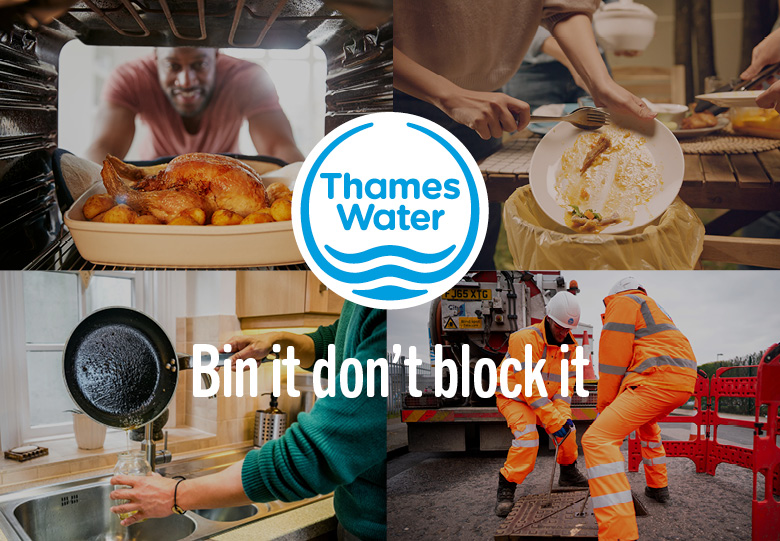Jingle bells, the sewer smells, Thames Water are here to say, throwing gravy down the drain, can ruin Christmas Day

- Thames Water has urged customers and businesses to dispose of their waste correctly this festive season, after 80% of blockages in 2024 were caused by items which should not have been thrown down the sewers.
- The water company has visited 4000 restaurants since April, to educate business owners on the dangers of throwing fat, oils and grease down the drains.
- 84% of blockages this year have been cleared using jets to help reduce the risk of repeat blockages down the line.
- Thames Water have also proactively cleaned over 1100 km of sewers this year.
Dashing down the drains, food, fats, grease and wet wipes, under the streets they go, blocking all the pipes. This holiday season, Thames Water are reminding the public to be mindful of how they discard of their waste over the holidays. Cooking oil from roast potatoes, leftover gravy, buttered greens, basted meats and pigs in blankets, can congeal to create fatbergs and block drains and sewers if put down the kitchen sink.
The UK’s largest water company, which has cleared around 52,000 blockages from sewer abuse this year, has five top tips to help prevent blockages at your home this festive period:
- Save or freeze left over gravy. If you don’t have much left, use kitchen roll to soak it up and throw it in the bin.
- Collect fats, oils and grease using tin foil, a jar or a yoghurt pot. Once it hardens you can wrap it up and throw it in the bin.
- Plan ahead! When doing your food shopping, spare a minute to think about how to dispose of your waste to help the big day go smoothly and check if your local council accepts fats as food waste.
- Get a sink strainer. This will help to catch any bits of food that end up in the sink which can then be thrown in the bin.
- Spread the word with friends and family to help make sure yours and their pipes are protected.
Tess Fayers Waste and Bioresources Director at Thames Water said: “We want all of our customers to be able to enjoy a festive season with free flowing pipes and unrestricted toilet use, therefore, we want to remind everyone to trap their fat, bin their wipes and avoid putting anything other than the three Ps (paper, poo and pee) into the sewer system.
“Sadly, all too often, fats, oils and greases can build up in our sewers, mix with other nasties and cause our sewers to block. In the worst cases, this can lead to homes and rivers becoming flooded with sewage. I’m afraid extra hot, soapy water doesn’t help as some would believe. So, we asking everyone to think carefully about what goes down the sink this festive season so that we can keep our pipes free flowing for all.”

Thames Water are also using new techniques to ensure the pipes keep flowing. In 2024 so far, 84% of reported blockages have been cleared using jets instead of rods, this is up from 50% two years ago. The use of jets breaks up the blockage rather than push the mass down the pipe, which can sometimes create a repeat blockage further down the line. With the increased use of jets over rods, the number of repeat blockages has gone from 16,000 to 11,000 since 2022, with numbers continuing to reduce.
Ty Harling, Operations Director Designate for The Lanes Group said: “Sewer abuse remains a significant challenge, especially during the festive season, when fats, oils, and grease (FOG) from Christmas dinner preparations can clog our drainage systems. At Lanes Group, we’re proud to support Thames Water in raising awareness and promoting sustainable behaviours to protect our shared infrastructure.
“Our increased focus on jetting over rodding is central to our first-time fix approach, ensuring sewer lines are thoroughly cleared and less prone to repeat blockages. This proactive method not only improves long-term performance but also enhances customer satisfaction by addressing the root cause of blockages more effectively.
“We’re also committed to educating communities about preventing sewer abuse through initiatives like Unblocktober, which provides valuable tips on how small changes can make a big difference in protecting our sewers.”
In 2024, 80% of blockages reported to Thames Water were caused by unflushable items. Every year, the company spends around £18 million removing blockages, including a recent fatberg in East London which weighed 35 tons and took 11 days to clear. Furthermore, the company executes a robust sewer cleaning programme which has resulted in a 7% blockage decrease year-on-year. This year they have proactively cleaned over 1,100km of their sewer network.
The sewer abuse network team at Thames Water have also visited over 4000 restaurants since April 2024, as part of their programme to educate business owners on the dangers of throwing fat, oils and grease down the drains. This comes as part of Thames Water’s “bin it don’t block it” campaign which reminds users the only items which should be flushed down the loo are the three P’s: Pee, poo and toilet paper.
